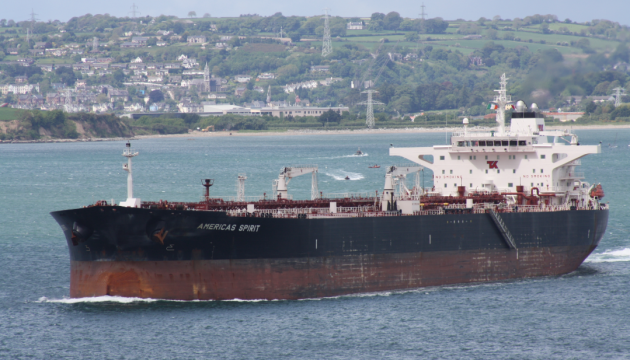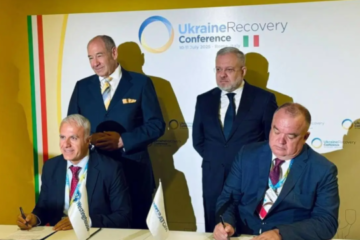
Russia has been illegally transshipping oil between tankers in the open sea off the coast of Greece and Cyprus.
This was reported by the Main Intelligence Directorate of Ukraine’s Defense Ministry (HUR), Ukrinform learned.
Since July 2024, Russia has been using an Aframax tanker, IMO 9247443, which has no Western insurance, as a floating transshipment hub for the supply of sanctioned oil.
As noted by the intelligence agency, such operations pose an environmental threat, allow the Russian Federation to conceal the origin of oil, evade international control, and ensure supply to third countries, bypassing sanctions.
The HUR published data on the vessel on the War&Sanctions portal.
The site has data on 159 oil tankers, most of which are part of the Russian shadow fleet, and personal data of 55 captains of that fleet.
In total, the database published data on 577 oil tankers with their total deadweight exceeding 63 million metric tons.
The GUR emphasized that in the fourth year of Russia’s full-scale invasion of Ukraine, oil and gas exports remain a key source of funding for the Russian budget. According to estimates, a third of these revenues in 2025 will be used to fuel the war against Ukraine.
The shadow fleet actively employs high-risk practices in maritime logistics, including disabling automatic identification systems, spoofing navigation data, transshipping oil through the night hours without proper illumination, flying flags of convenient jurisdictions, and registering shell companies.
These actions pose serious threats to environmental safety, especially given the technical condition of the old vessels in the shadow fleet and the lack of insurance, which can lead to large-scale accidents and environmental disasters close to the EU coasts.
In addition to evading sanctions, Russia uses its shadow fleet as an element of hybrid warfare. There have been cases where such vessels participated in reconnaissance and sabotage operations, in particular in the Baltic Sea, where they spy on naval infrastructure, underwater cables, and other critical objects.
The HUR emphasizes the need to increase sanctions pressure on Russian economy, in particular, reducing the oil and petroleum products price caps, having the G7 and EU refuse from importing petroleum products produced from Russian oil, banning STS operations in the territorial waters of the G7 and EU countries, strengthening control over the insurance coverage of ships in the Western market, and introducing a complete ban on the import of Russian liquefied natural gas and pipeline fuel.
The HUR continues to document the mechanisms of Russia’s sanction evasion and expose the structure of the network which helps the Kremlin finance the war against Ukraine.
The War&Sanctions portal remains a tool for systematic exposure and international counteraction to Russian shadow maritime logistics, the report reads.
As Ukrinform reported earlier, Sweden will strengthen control over foreign vessels in the Baltic Sea starting July as part of the fight against the Russian shadow fleet.
Photo: shipspotting.com
Source: Russia illegally transshipping oil off Greece, Cyprus coasts - Ukraine intelligence



